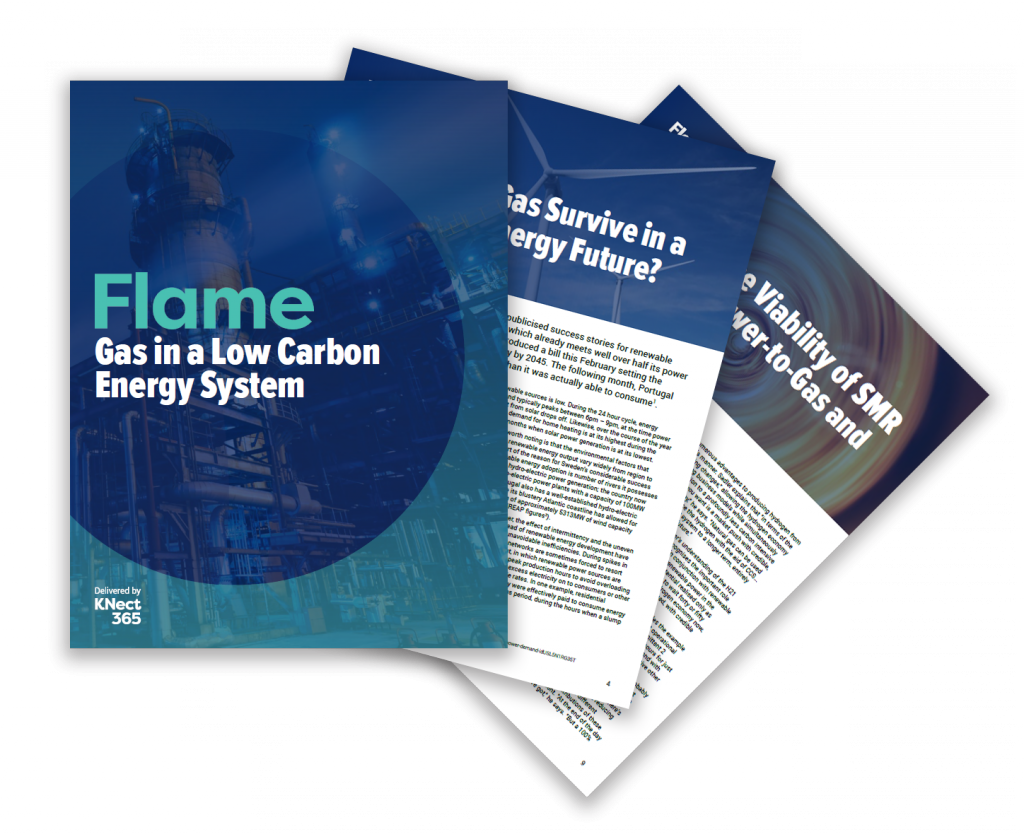Gas in a Low Carbon Energy System: Industry Review Paper

Gas in a Low Carbon Energy System
Can natural gas survive in a renewable energy future? Will technologies like SMR Hydrogen, P2G and Biomethane secure the gas networks a place in a low carbon energy system? How will the decarbonisation of the gas networks progress over the medium to long term? Our new industry review paper covers these questions and more.
Extract:
It is clear that tackling anthropogenic climate change will mean reducing emissions from fossil fuels. Less clear is what the eventual balance of renewable power generation and low carbon energy solutions will look like, and what role natural gas can still play as a cheap and comparatively low emission fossil fuel.
Opinions among stakeholders vary. On one side there are those who see the actual volume of demand for natural gas remaining largely unaffected by the growth of renewables. In this scenario, natural gas is still needed to cover for the intermittency of renewable power, meeting a significant proportion of the demand left by the retreat of coal in power generation, and a material share of that left by oil in the transport sector. Electrification of industry and heating is slow to take hold, creating opportunities for natural gas to maintain and expand its role. Growth in gas use in emerging economies is also driven by the increased market penetration of LNG.
Others are more pessimistic about natural gas’s prospects. For them, the future will be shaped by improvements in battery storage technology, higher electrification uptake among residential and industrial end users, and an implicit bias against fossil fuels at any cost among policy makers and regulators. The result of the pessimistic scenario will be a stalling in demand growth for natural gas sooner than the industry might hope, followed by a gradual falling off in global natural gas consumption.
The perspective this paper is inclined to favour is that there is another option; one which plays to the strengths of both approaches. In this version of events, gas networks continue to deliver energy to the regions in which they are well developed, and for the uses to which they are best suited. But they are gradually decarbonised as the share of biomethane and hydrogen from steam methane reformation (SMR) increases. Renewable energy makes significant in-roads into power generation, but is complemented by power-to-gas technology, solving the problem of inter-seasonal energy storage and improving the efficiency of long distance energy transmission.
Electrification can play a role in decarbonising residential heating, but in the form of hybrid heating solutions able to deliver fast and effective heating when it is most needed. Electric vehicles make great progress in transport, but only as part of a much more diverse vehicle fleet, with high gas penetration in heavy haulage, rail and shipping. Meanwhile, LNG continues to provide market flexibility and meet fluctuations in regional demand, while becoming progressively greener as the share contributed by biological sources increases.
Prior to the composition of this paper we spoke to a range of experts, including industry analysts, representatives from major distributors, network operators, and project specialists. You can find out more about each of them in the biography section. Our objectives were to represent a variety of perspectives from within the industry about how gas can adapt for its future, to assess the viability of some of these pathways, and to stimulate thought and discussion about the role gas can play in delivering a low carbon energy system.
This is an extract from the introduction to Gas in a Low Carbon Energy System. Download the full paper now for free!
Contents:
- Introduction
- Can Natural Gas Survive in a Renewable Energy Future?
- An Interview with Tim Boersma, Director of Global Natural Gas Markets at the Centre on Global Energy Policy
- Assessing the Viability of SMR Hydrogen, Power-to-Gas and Biomethane
- An Interview with Dr Axel Wietfield, Managing Director of Uniper Energy Storage GmbH
- Biographies
